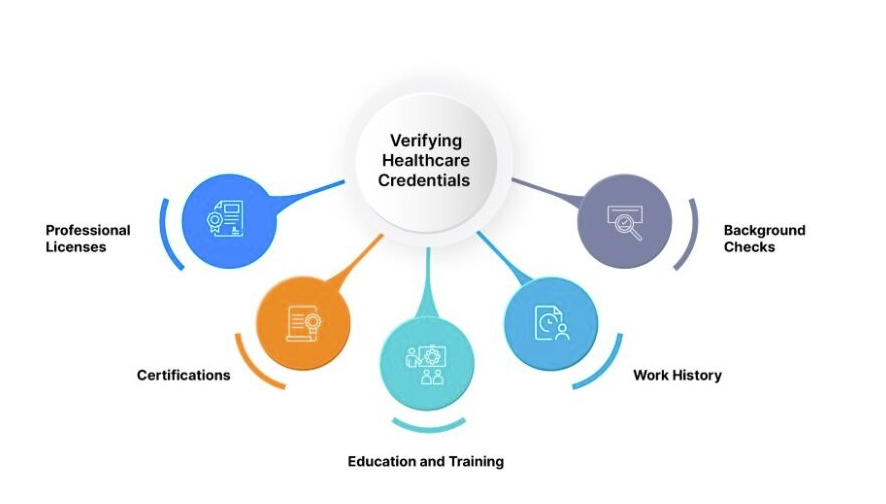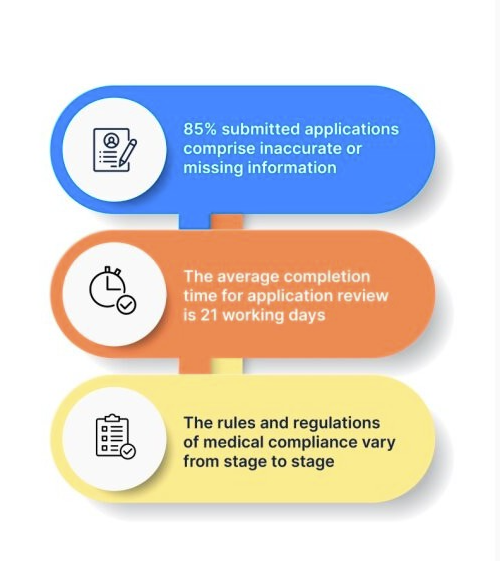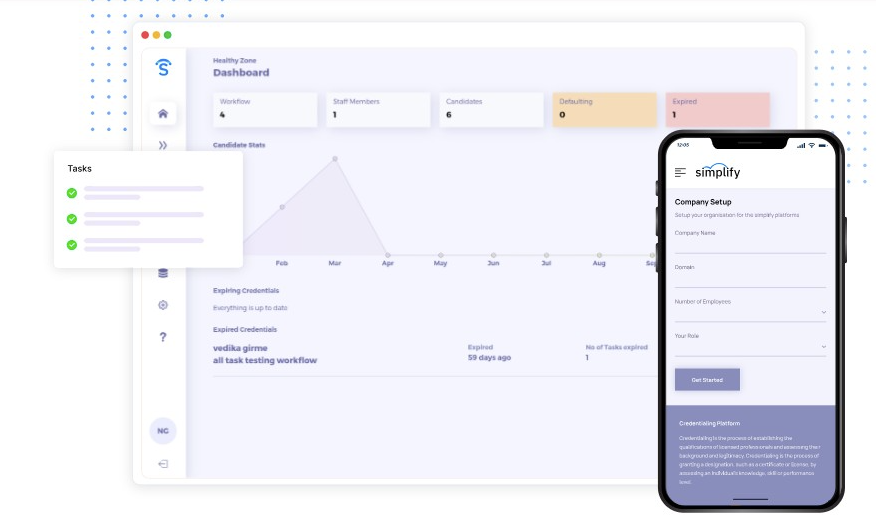What is the Importance of Credentialing in Healthcare?

Credentialing is a vital component of healthcare operations.
For seamless daily operations, it’s very important for healthcare administrators to grasp the concept of credentialing, its procedures, best practices, and resources required for efficient credentialing.
In today’s post, we will discuss the importance of credentialing in the healthcare industry, shedding light on its significance in upholding standards, patient safety, and organizational integrity.
Before we dive deep, let us understand what exactly healthcare credentialing is, and the various aspects associated with it.
Understanding the Healthcare Credentialing Process
In simple words, credentialing in healthcare means checking if healthcare workers are qualified and capable.
It’s like making sure only the right people take care of patients.
Healthcare credentialing includes the verification and assessment of healthcare professional’s qualifications, experience, and competency.
What Credentials Do You Need to Verify?
Healthcare credentialing is a vast process, and you need to acquire a lot of information.

Professional Licenses: Ensure that the individual holds valid licenses required for their specific role, such as nursing licenses or medical licenses.
Certifications: Check if the individual has relevant certifications like Advanced Cardiac Life Support (ACLS) or Pediatric Advanced Life Support (PALS) depending on their job responsibilities.
Education and Training: Confirm the completion of necessary education and training programs relevant to their role in healthcare.
Work History: Verify their previous work experience in healthcare settings to ensure they have the necessary skills and experience.
Background Checks: Conduct background checks to screen for any criminal history or disciplinary actions that may affect suitability for the role.
NOTE: The credentialing requirement varies from organization to organization, region to region. The above list comprises some basic credentialing that you need to verify.
Why Credentialing is so Important for Healthcare Organizations?
In today’s ever-evolving healthcare landscape, regardless of the nature or size of your healthcare facility, ensuring efficient credentialing process is very crucial.
Whether you operate within the realms of private or public healthcare, catering to a broad spectrum of medical needs, the significance of swift, precise, and thorough credentialing cannot be overstated.

By prioritizing the seamless execution of these procedures, healthcare organizations can not only uphold regulatory compliance but also foster a culture of excellence in patient care delivery.
Here are some of the reasons why credentialing is so important to any healthcare organization.
#1. Ensuring Patient Safety and Quality Care Delivery
The foremost significance of credentialing lies in safeguarding patient safety and ensuring quality care delivery. By verifying the credentials of healthcare professionals, including their education, training, and licensure, healthcare organizations mitigate the risks associated with incompetent or unqualified practitioners. This process instills confidence among patients, knowing that they are receiving care from competent professionals who meet established standards of practice.
#2. Upholding Organizational Integrity and Reputation
Credentialing also plays a pivotal role in upholding organizational integrity and reputation. Healthcare organizations that prioritize credentialing demonstrate their commitment to quality and patient safety. By ensuring that their staff members possess the necessary qualifications and credentials, these organizations bolster trust among patients, regulatory bodies, and stakeholders. Additionally, maintaining a credentialed workforce enhances the organization's reputation as a provider of high-quality care.
#3. Compliance with Regulatory Standards
In the highly regulated healthcare landscape, compliance with regulatory standards is non-negotiable. Credentialing ensures adherence to these standards by verifying that healthcare professionals meet the requirements set forth by regulatory bodies and accrediting agencies. This not only helps healthcare organizations avoid legal ramifications but also fosters a culture of accountability and compliance.
#4. Facilitating Credentialing and Privileging Processes
Credentialing streamlines the credentialing and privileging processes within healthcare organizations. By establishing standardized procedures for verifying and assessing credentials, organizations can efficiently onboard new staff members, grant clinical privileges, and maintain updated credentialing records. This streamlined approach improves operational efficiency, reduces administrative burden, and ensures regulatory compliance.
#5. Enhancing Patient Experience and Satisfaction
Credentialing indirectly contributes to enhancing patient experience and satisfaction. When patients receive care from credentialed healthcare professionals, they are more likely to experience positive outcomes and satisfaction with the services provided. Moreover, knowing that their healthcare providers are qualified and competent instills a sense of trust and confidence in patients, fostering strong patient-provider relationships.
#6. Supporting Continuous Quality Improvement
Credentialing serves as a cornerstone for continuous quality improvement initiatives within healthcare organizations. By regularly reviewing and updating credential criteria, organizations can adapt to evolving healthcare trends, technologies, and best practices. This ongoing quality assurance process ensures that healthcare professionals maintain competency throughout their careers, ultimately enhancing the overall quality of care delivery.
How to Ensure a Smooth & Accurate Credentialing Process?
Healthcare credentialing involves a significant amount of paperwork, documentation, and verification processes.
Using VMS software with credentialing capabilities streamlines these tasks, reducing the time and effort required to complete them. Automation can handle repetitive tasks, such as data entry and verification, allowing healthcare professionals to focus on more critical aspects of their work.
How to Select the Right Healthcare Credentialing Software?
There are numerous vendor compliance management solutions in the market, offering basic features like data storage, online verification, and more.
However, if you aim to enhance the effectiveness and efficiency of your organization’s credentialing process then seek out top-notch credentialing software that comprise the following features:
#1. Customized Reporting

Automated credentialing eliminates the need for manually creating different reports to analyze workflow parameters.
Intuitive, comprehensive, and customized reporting features enable users to retrieve insightful data and customize reports to their requirements, featuring institutional summaries, days in enrolment, facility summaries, provider summaries, and a lot more.
#2. Cloud-Based System

Opting for credentialing software that stores data in the cloud completely eradicates portability issues.
That means you can select users in your organizations who will have access to the credentialing system from any digital device but with full security.
#3. Workflow Automation

Credentialing involves various tasks, including data collection from healthcare providers, credentialing strategy development, verification of credential licenses, and more.
This is where software with real-time dashboards and automated workflows for credentialing metrics, onboarding, can significantly save time, enhance accuracy, and maximize productivity.
#4. Document Expiration Management
Credentialing software tailored to your needs helps to track provider’s profiles, documents, certificates nearing expiration, and changes in performance metrics.
Configurable expiration reminders and alerts ensure timely notifications to staff responsible for these tasks.
#5. Electronic Forms & e-Signatures

Comprehensive credentialing software solutions facilitating the use of electronic forms and e-signatures minimize delays in obtaining medical consent forms or signatures, benefiting healthcare professionals where every second counts.
Wrapping Up
In conclusion, the importance of credentialing in the healthcare industry cannot be overstated. From ensuring patient safety and quality care delivery to upholding organizational integrity and regulatory compliance, credentialing serves as a cornerstone for maintaining high standards within the healthcare sector.
By prioritizing credentialing processes and embracing a culture of continuous quality improvement, healthcare organizations can enhance patient outcomes, foster trust, and uphold excellence in care delivery.
That’s a wrap for today.
If you find this article helpful, you must check the following resources:
- 7 Questions You Must Ask Before Selecting a VMS
- 6 Reasons to Invest in a VMS
- Can Direct Sourcing Improve the Quality of Hires
- Smarter Healthcare Staffing Strategies and Best Practices
Frequently Asked Questions (FAQs)
Q: What is the credentialing process in the healthcare industry?
The credentialing process involves verifying healthcare professionals' qualifications, licenses, certifications, and other credentials to ensure they meet established standards for clinical practice.
Q: How long does the credentialing process typically take?
The duration of the credentialing process varies depending on factors such as the complexity of the practitioner's credentials, the efficiency of the credentialing organization, and the availability of required documentation. On average, it can take several weeks to several months to complete.
Q: What are the consequences of not credentialing healthcare professionals?
Failing to credential healthcare professionals can have serious consequences, including compromised patient safety, legal liabilities, reputational damage to the organization, and regulatory non-compliance.
Q: How does credentialing contribute to healthcare quality improvement initiatives?
Credentialing supports healthcare quality improvement initiatives by ensuring that practitioners possess the necessary qualifications and competencies to deliver safe, high-quality care. By maintaining a credentialed workforce, organizations can uphold standards of practice and continuously improve patient outcomes.
Q: What role do accreditation bodies play in the credentialing process?
Accreditation bodies set standards for healthcare quality and safety and assess healthcare organizations' compliance with these standards. Credentialing organizations often align their processes with accreditation requirements to ensure consistency and regulatory compliance.




Your comments